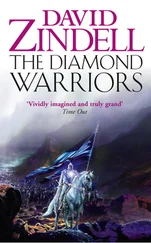David Gibbins - The Tiger warrior
Здесь есть возможность читать онлайн «David Gibbins - The Tiger warrior» весь текст электронной книги совершенно бесплатно (целиком полную версию без сокращений). В некоторых случаях можно слушать аудио, скачать через торрент в формате fb2 и присутствует краткое содержание. Жанр: Прочие приключения, на английском языке. Описание произведения, (предисловие) а так же отзывы посетителей доступны на портале библиотеки ЛибКат.
- Название:The Tiger warrior
- Автор:
- Жанр:
- Год:неизвестен
- ISBN:нет данных
- Рейтинг книги:4 / 5. Голосов: 1
-
Избранное:Добавить в избранное
- Отзывы:
-
Ваша оценка:
- 80
- 1
- 2
- 3
- 4
- 5
The Tiger warrior: краткое содержание, описание и аннотация
Предлагаем к чтению аннотацию, описание, краткое содержание или предисловие (зависит от того, что написал сам автор книги «The Tiger warrior»). Если вы не нашли необходимую информацию о книге — напишите в комментариях, мы постараемся отыскать её.
The Tiger warrior — читать онлайн бесплатно полную книгу (весь текст) целиком
Ниже представлен текст книги, разбитый по страницам. Система сохранения места последней прочитанной страницы, позволяет с удобством читать онлайн бесплатно книгу «The Tiger warrior», без необходимости каждый раз заново искать на чём Вы остановились. Поставьте закладку, и сможете в любой момент перейти на страницу, на которой закончили чтение.
Интервал:
Закладка:
Godavari River, India, 20 August 1879
Lieutenant John Howard, Royal Engineers, took off his pith helmet and wiped his brow. The sun was bearing down directly on the deck of the steamer now, and it was deuced hot. The brass helmet plate of the Queen’s Own Madras Sappers and Miners gleamed up at him, lovingly polished by his batman that morning. But it presented an excellent mark for a sharpshooter, and he rubbed his grimy palm into it, and then replaced the helmet on his head. He reached out to touch the metal casing of the paddlewheel, the last spot of shade along the side of the vessel, but the metal was like a furnace. A lump of coal rolled out from under an oilskin in front of him and he kicked it despondently. At least they had managed to get that dry. He had seen speckles of iron pyrites in the coal, and had remembered an alarming demonstration of spontaneous combustion in damp coal at the School of Military Engineering. It would have been a less than glorious end to his first field command, immolated on a sandbar in a godforsaken river gorge in the jungle of eastern India, without ever having fired a shot. He was beginning to realize that war was like that.
He watched a crocodile swim languidly by, seemingly oblivious to the drama unfolding at the river bend, then shifted to face the foredeck of the vessel, pulling his Sam Browne belt around so his holster was out of the way, and keeping his head below the iron plating they had erected as bullet-proofing in the river port at Rajahmundry. He glanced at the nameplate, Shamrock, then at his men. Kneeling behind the plating were a dozen Madrasi sappers, their cartridge pouches open and their Snider-Enfield rifles at the ready. Beyond them was the seven-pounder gun, with canisters of grapeshot and a sponging rod laid alongside. Colonel Rammell had urgently requested mountain pack guns for the mules but instead they had been sent two muzzle-loading field pieces with fixed carriages, useless in the jungle. At the last minute the sappers had installed one on the river steamer, and had devised a block and tackle to keep the recoil under control. Beyond the gun the lascar boatmen were still engaged in a futile effort to kedge the vessel off the sandbar which had held them fast for almost two days now. During the night another boat had come upriver, delivering a replacement officer and taking away some of the sappers broken by jungle fever, but every effort of the crewmen had failed to dislodge the steamer. That was another reason to pray for the return of the monsoon. With the river in full spate, they would float off and be able to continue their voyage upriver to Wuddagudem, where they were supposed to be hacking a road out of the jungle. Their mules were still standing patiently in the lee of the deckhouse, with racks of picks and axes stacked beside them. One of the lascars was there too, lying unconscious on a stretcher. His moans and cries had made the previous night intolerable. The afternoon before, the boatmen had taken the anchor out in the little boat and dropped it a hundred feet away, and the unfortunate lascar had been at the capstan when the hawser had broken and snapped back, mangling his legs. Surgeon Walker had dosed him with brandy and laudanum but there was nothing more he could do. The lascar had been their only casualty of the expedition so far, and Howard was too tired for another night like that. He fervently hoped the man would not last the day.
There was a lazy whine overhead, followed by a dull thump and a puff of smoke from the opposite shore. A copiously moustached figure walked into view from behind the deckhouse and planted himself firmly behind the line of riflemen, his hands behind his back and his heavy Adams revolver drawn. He turned toward Howard, and a bloodshot eye bore down on him from under the peak of his pith helmet.
“Shall we give them a volley, sir? Put the wind up them. Fucking savages.”
“Sergeant O’Connell. Might I remind you we are desired by government to open negotiations to induce the rebels to free the native constables they have taken captive.”
“Poppycock, sir, if I may say so.”
“You may. Meanwhile, hold your fire.”
The moustache twitched. “Very good, sir.”
Howard took out a brass and ivory pocket telescope from a pouch on his belt, raised his head slightly over the plating and peered through the telescope at the far bank. There were dozens of them now, streaming down from the village, lean, dark men clad in loincloths, some carrying bows and arrows and others long matchlock smoothbores. He could see that some were more extravagantly made up, their long hair combed and braided forward and embellished with red cloth and feathers. Some of them carried skin drums and brass trumpets. Along the foreshore clusters of men were digging pits in the sand and erecting three bamboo poles in a line against the edge of the jungle. They had lit large bonfires, and the swirling black smoke drifted over the river, obscuring the scene from the steamer. It was unsettling to view, flashes of activity revealed and then obscured in the smoke, impossible to discern the intent. At any moment they might pull out their canoes and mass for attack. Howard turned to the sergeant. “Their last fusillade was up in the air. There’s something odd going on over there. They’re right on the edge of the riverbank, as if they want us to see them, taunting us. If they start aiming at us, you can let fly. On my command. You understand?”
“Sir.” The sun-scorched face stared resolutely forward.
Howard looked out at the scene again. A week ago, washed by the rain, this had been a place of shimmering beauty, the great gorge of the Godavari snaking its way through hills of sparkling green, rising on either side five hundred feet or more, with the ridges and peaks of the Eastern Ghats beyond. But now, it was as if a heavy miasma had risen up from the river and choked the valleys in veils of mist. The river was a lifeline, the only place where the sun burned through, and everywhere else was cloaked, sinister. He could sense the fear and superstition of the spirit world, the hundred gods and demons these people believed lurked in the jungle. His first patrol ashore had deeply unnerved him, and it was not just the rebels waiting in ambush. There was something else there, something that had kept these dark places remote and impervious from the march of progress across the continent. He could understand why their native bearers from the coastal lowlands feared and despised this place, and refused to come with them beyond Rajahmundry. He took a deep breath and raised his eyeglass again toward the reed-roofed village that spread along the opposite riverbank, and the increasing throng of natives who swirled and danced around the fires on the sandy foreshore. He turned to the Indian officer beside him, a ferocious-looking Madrasi in a turban, with piercing dark eyes. He spoke to him in Hindi. “Jemadar, pass the word for Mr. Wauchope, would you?”
“Sahib.”
A few moments later a tall figure ambled out from the deckhouse, carrying a small open book in one hand. He wore dust-colored khaki, the new fad among officers fresh from the northwest frontier, and his puttees were bound with strips of colorful Afghan cloth. He was bareheaded and tanned, with a thick crop of black hair and a full beard. Howard had spoken to him briefly when he had arrived during the night with the reinforcements, hearing the latest news from Afghanistan, but Wauchope had promptly gone to sleep in what counted as the officers’ quarters under a mosquito net beside the deckhouse. Howard was looking forward to having another officer on deck, one who was famously unruffled, just what was needed to keep them all from becoming unhinged by the darkness and sorcery of this place.
Wauchope peered at the tumult on the opposite shore, pursed his lips, then nodded at Howard. He had sharp eyes, intense like the jemadar’s, but with humor in them. “I was looking for the saloon,” he said, with a pronounced drawl. “I have come to realize that this is not exactly a Mississippi River steamer.”
Читать дальшеИнтервал:
Закладка:
Похожие книги на «The Tiger warrior»
Представляем Вашему вниманию похожие книги на «The Tiger warrior» списком для выбора. Мы отобрали схожую по названию и смыслу литературу в надежде предоставить читателям больше вариантов отыскать новые, интересные, ещё непрочитанные произведения.
Обсуждение, отзывы о книге «The Tiger warrior» и просто собственные мнения читателей. Оставьте ваши комментарии, напишите, что Вы думаете о произведении, его смысле или главных героях. Укажите что конкретно понравилось, а что нет, и почему Вы так считаете.












